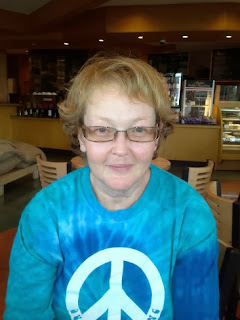Why did you take Literary Journalism?
To be honest, I discovered after the first class meeting that I was taking a different course than I anticipated. Prior to this semester, I thought "literary journalism" was the kind of writing that Joan Didion, Hunter S. Thompson and to some extent, David Foster Wallace wrote. I thought I was taking a course on what I would now call "artful journalism," or journalism with literary merit. That topic was interesting to me, because I am concentrating in non-fiction for my degree and much of my reading has been very artful journalism. I also enjoy writing about writing, and I wanted to take at least one course with Lynne Barrett while I'm still in school.
What did you hope to learn in this course?
Lynne has a reputation for being an excellent editor and a challenging teacher, so my expectations coming in were more focused on technical aspects of writing than on a specific topic. To give you a short answer, I'd have to say I took the class because I think it will help me improve my writing to work with a teacher I know will challenge me.
What have you learned so far?
So far, I've learned that "literary journalism" is a much larger field of writing than I was aware, that it is possible to support oneself with an MFA after graduation, and that writing overall is changing rapidly with the advent of electronic media.
When did you begin blogging and why?
I work on two different blogs. My personal blog is one I neglect to write. I started it after having an essay published in Sliver of Stone, mainly because I have seen friends who are trying to start their careers as writers. My friends who write blogs regularly are able to find readers easily through the world wide web. In a way, I suppose blogging is the most convenient vanity press ever, and much less expensive than going through a printer.
The second blog, Selfies in Ink, is a collaborative art project on Tumblr. I was invited to be a regular contributor to that blog by the editor, Dana Jaye Cadman. Her vision was to pair women writers' poems and flash memoir pieces with cell phone self portraits. By doing this, we are able to take authority over the images we project of ourselves and create identities that we determine separate from what is typically expected of women. It's a good, sneaky way to subvert many of the oppressive niches society often tries to cram women into. The scope of the project is expanding also, as men have begun contributing, and truthfully men are getting shoved into corners as often as women are, so it's only fair we include them.
What are the advantages of blogging? Disadvantages?
The advantages I would say are that blogging is a good way for a writer to get publicity, and to attract readers. I think the flip side is that it is hard sometimes to be regular about posting, the criticism seems to be a lot nastier on the web than it is in response to print publications, and there is no editorial oversight, so if I write something that is factually incorrect, or even just grammatically incorrect, there is no one there to point out my errors.
About Jan Becker
Jan Becker is an MFA candidate at Florida International University. Her writing has appeared in Sliver of Stone, The Florida Book Review, The Circus Book, Brevity Poetry Review and Emerge. She is a regular contributor to Selfies in Ink, an online writing and art project.
Twitter:
Web Site/Blog: http://selfiesinink.com/tagged/janbecker
http://selfiesinink.com/
http://olivepoetryblog.wordpress.com/
Facebook: https://www.facebook.com/jan.becker
***

No comments:
Post a Comment